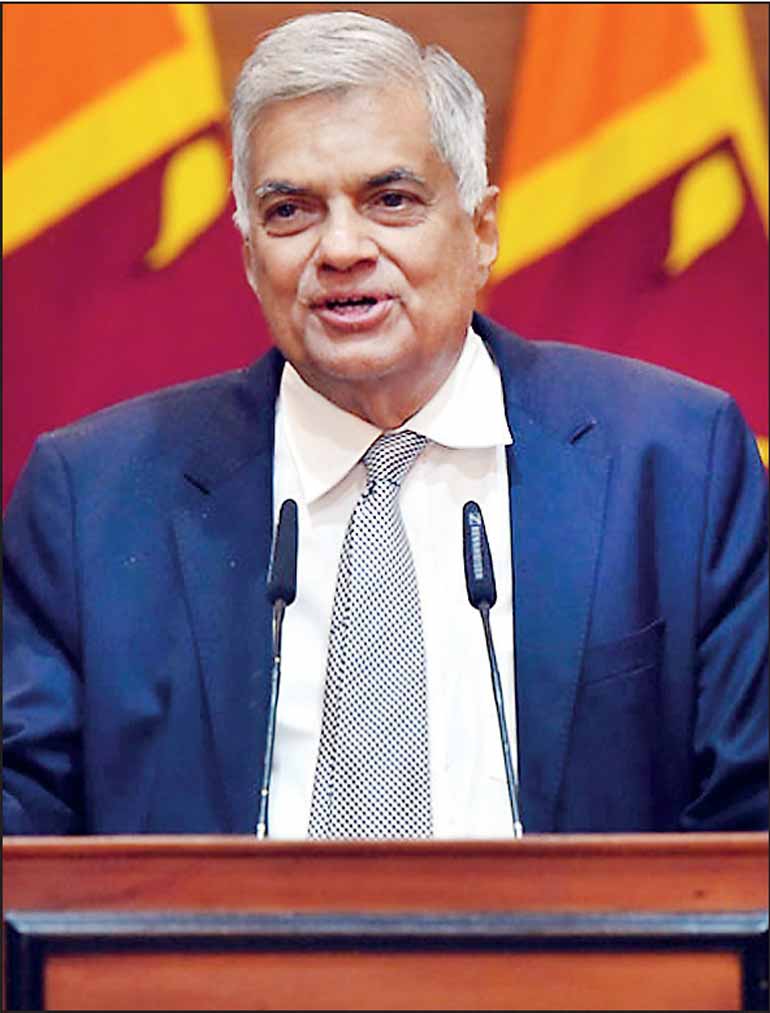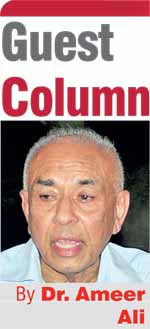Monday Feb 23, 2026
Monday Feb 23, 2026
Friday, 6 January 2023 00:00 - - {{hitsCtrl.values.hits}}

Behind the economics of bankruptcy and poverty lies an agenda
for political power
However (political parties) may now and then answer popular ends, they are likely in course of time and things, to become potent engines, by which cunning, ambitious and unprincipled men will be enabled to subvert the power of the people and to usurp for themselves the reins of government, destroying afterwards the very engines which have lifted them to unjust dominion
– George Washington
Lanka’s economic collapse and financial bankruptcy are unnatural, unprecedented and have political origins. Never in the recorded memory of this island did so many millions continue to endure so much misery for so long and with so little hope. Perhaps and thanks to their belief in fate or karma, Sri Lankans seem to have resigned to their poverty, allowing its originators to go unpunished and watching them continue to plan their next move. It is with this tragedy that 2022 came to a close and 2023 ushered in. But what is in store for the new year?
so little hope. Perhaps and thanks to their belief in fate or karma, Sri Lankans seem to have resigned to their poverty, allowing its originators to go unpunished and watching them continue to plan their next move. It is with this tragedy that 2022 came to a close and 2023 ushered in. But what is in store for the new year?
President Ranil Wickremesinghe on his part is trying to convince the people that because of certain tough security, monetary and fiscal measures that he and his ministers along with the CBSL Chief undertook, that the worst of the crisis is behind and that things could only get better if the whole nation rallies behind him. It was with that call and assurance that he presented his 2023 Budget with unprecedented tax hikes with not so unprecedented expenditure savings, all with a view to satisfy the IMF advisors, and as RW’s first step towards transforming Sri Lanka into a high-tech-export-oriented First World Nation by the centenary independence year, 2048. The fact that the budget hardly mentioned any measure to improve tax collection, a perennial problem in the country shows no commitment to change the system.
After suppressing the Aragalaya youth movement, the President carried an olive branch and invited the youth to join him in his 25-year economic marathon. He also casually justified their demand for system change without providing any details about the nature and content of that change. Instead, to allow the system to run smoothly, he has invited the leaders of ethnic minorities and of other political parties represented in the parliament to propose measures to resolve the so-called national question. But, behind all these moves and gestures is the underlying agenda of RW and his political party UNP to rebuild their lost image and go before the people for a fresh mandate to extend the term of his presidency beyond its current expiry date. Thus, behind the economics of bankruptcy and poverty lies an agenda for political power. And that agenda no doubt would dominate the events in 2023. But what about the economics itself?
One undisputable fact about the economics of current bankruptcy and poverty is its international dimension characterised by a mixture of altruism and geo-politics. In the name of rescuing the beleaguered economy and helping it to achieve stability, growth and prosperity what is actually at play is an attempt by regional and global players to pull the country into their respective zone of influence. IMF’s conditionalities for economic assistance, India’s enlarged benevolence with a civilisational twist and China’s readiness to lend more while prevaricating to negotiate debt restructuring, are all, in a sense, different manifestations of geopolitical power play.
Even Japan’s economic assistance for that matter is tinged with geopolitical calculations. Adding to this external dimension are the political and diplomatic manoeuvres of the diaspora community. All this has made domestic politics a side show to developments happening outside. In that sense, international involvement in economic assistance and benevolence and an over-reliance on external help has left domestic economic policy making bereft of any originality. How did this happen and how could the country act more independently and with some originality?
Financial bankruptcy followed by economic collapse left local rulers with no choice but to seek outside help. Former President GR and his economic viyathmaga experts’ empty bravado of an indigenous alternate path to rescue the economy without changing the system only postponed the day of reckoning, and among those who advocated a quick redemption through IMF was GR’s successor and current president, RW. Although RW is well-known in Western circles for his neo-liberal credentials, it was the only logical remedy for an economy that was already locked into the orbit of free market economics since 1978.
IMF, one of the twin sisters of Bretton Woods, the other being the World Bank, was constitutionally entrusted with the task of disciplining economies that had become too prodigal and fallen by the way side. But the need to discipline and get the economy back on track received added urgency because of the very strategic position of Sri Lanka in Indian waters. That ocean has emerged as the main theatre of action for a renewed Cold War between the West led by a declining super power, US, and the East with a rising regional power, China.
That Sri Lanka had shifted too close to China, not by any ideological design or commitment but by the force of circumstances surrounding the ethnic war, is now well documented. US’ refusal to supply weapons and India’s choice of neutrality left Sri Lanka with no option but to go to the international arms bazaar with borrowed money to get militarily equipped to fight the LTTE menace. China was only too willing to help. A friend in need naturally became a friend indeed. Yet, it was that fatal choice of fighting and winning the war at any cost, which ultimately drove this country to bankruptcy, an inconvenient truth hard to digest by civil war victors. And, it was that bankruptcy with its ensuing poverty which provided another opportunity for the US and its allies, including India to re-strategise their relations with Sri Lanka. China’s foot dragging to finalise debt restructure negotiations should be seen as its attempt to thwart that strategy.
With this international complication, how much of funds would ultimately be made available to rebuild the shattered economy and set it on a growth path is all a matter of guess. Apart from the $ 2.9 billion promised by the IMF, which is also getting delayed by months, Foreign Minister Ali Sabry expects another $ 5 billion loan from multilateral agencies in 2023. According to him, India is also expected to invest to the tune of over $ 1 billion to counter China’s largesse. And recently, Justice Minister Wijeyadasa Rajapakshe (WR) revealed that a staggering $ 53 billion belonging to nationals are stacked away in foreign countries, which speaks volumes not about the politics of poverty but about the poverty of Sri Lankan politics. Even if one half of WR’s revelation is proved true that would be a shameful testimony to the financial drain facilitated by the system in operation. However, with all these birds in the bush and none in hand, IMF, WB, ADB, CT CLSA Securities and international credit agencies have all downgraded the prospects of SL’s economic growth in 2023. That downgrading is closely associated with a looming global recession expected to dominate the new year.
This economic pessimism and politics of bankruptcy has exposed a policy bankruptcy among local politicians. Without any proposal or scheme to change the entire system of political governance, economic management and public and judicial administration, all of which are conditioned by a constitution grounded in sectarianism and ethno-nationalism, no budgetary reforms or grandiose plans are going to pull the country out of its morass, either in the silver jubilee year 2023 or centenary year 2048. None of the political parties that are vying for power, with the solitary exception of NPP, seems to have grasped the need for and depth of system change, the core demand of the Aragalaya youth.
In that sense, President RW’s passing references to the need for system change and his subsequent manoeuvres to resolve the national question lack sincerity and reflect only his primary desire to remain as president with refining the existing system at the edges at most. Economics of poverty has ultimately led to poverty of politics in this blessed island. To say that no political leader could fix the crisis, as stated by the cabinet spokesperson Bandula Jayawardena recently, is admission of impotency in originality of economic thinking. Reliance on external help may be of short-term value, but the country’s long-term prosperity and independence depend on system change!
“When you want to help people, you tell them the truth. When you want to help yourself, you tell them what they want to hear. People with careers as ethnic leaders usually tell their followers what they want to hear.” – Thomas Sowell, Wealth, Poverty and Politics, 2015
(The writer is attached to Murdoch Business School, Murdoch University, Western Australia.)